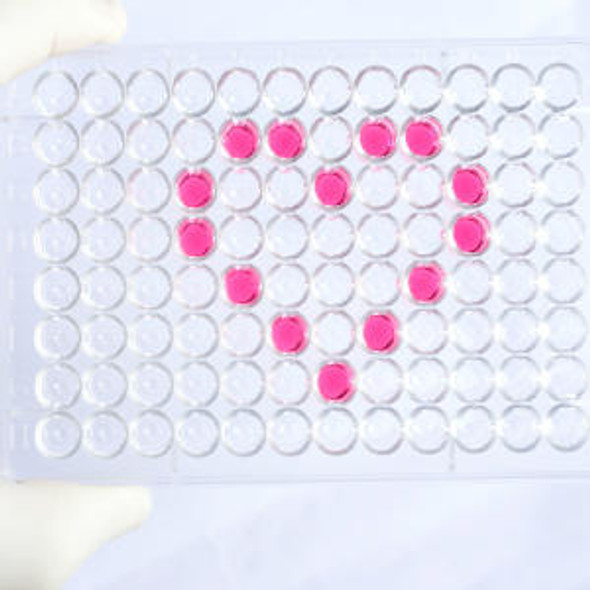Enzymes Recombinant Proteins
Human STK11 Recombinant Protein (RPPB2653)
- SKU:
- RPPB2653
- Product Type:
- Recombinant Protein
- Species:
- Human
- Uniprot:
- Q15831
- Research Area:
- Enzymes
Description
| Product Name: | Human STK11 Recombinant Protein |
| Product Code: | RPPB2653 |
| Size: | 10µg |
| Species: | Human |
| Target: | STK11 |
| Synonyms: | Serine/threonine-protein kinase STK11, Liver kinase B1, LKB1, hLKB1, Renal carcinoma antigen NY-REN-19, STK11, LKB1, PJS |
| Source: | Escherichia Coli |
| Physical Appearance: | Sterile Filtered colorless solution. |
| Formulation: | The STK11 solution (0.5mg/ml) contains 10% Glycerol and 20mM Tris-HCl buffer (pH 8.0). |
| Stability: | Store at 4°C if entire vial will be used within 2-4 weeks. Store, frozen at -20°C for longer periods of time. For long term storage it is recommended to add a carrier protein (0.1% HSA or BSA).Avoid multiple freeze-thaw cycles. |
| Purity: | Greater than 85.0% as determined by SDS-PAGE. |
| Amino Acid Sequence: | MGSSHHHHHH SSGLVPRGSH MGSMEVVDPQ QLGMFTEGEL MSVGMDTFIH RIDSTEVIYQ PRRKRAKLIG KYLMGDLLGE GSYGKVKEVL DSETLCRRAV KILKKKKLRR IPNGEANVKK EIQLLRRLRH KNVIQLVDVL YNEEKQKMYM VMEYCVCGMQ EMLDSVPEKR FPVCQAHGYF CQLIDGLEYL HSQGIVHKDI KPGNLLLTTG GTLKISDLGV AEALHPFAAD DTCRTSQGSP AFQPPEIANG LDTFSGFKVD IWSAGVTLYN ITTGLYPFEG DNIYKLFENI GKGSYAIPGD CGPPLSDLLK GMLEYEPAKR FSIRQIRQHS WFRKKHPPAE APVPIPPSPD TKDRWRSMTV VPYLEDLHGA DEDEDLFDIE DDIIYTQDFT VPGQVPEEEA SHNGQRRGLP KAVCMNGTEA AQLSTKSRAE GRAPNPARKA CSASSKIRRL SACKQQ |
STK11, which controls cell polarity and functions as a tumour suppressor, belongs to the serine/threonine kinase family. Mutations in this gene have been linked to Peutz-Jeghers syndrome- an autosomal dominant disorder. It is characterized by the growth of polyps in the gastrointestinal tract, pigmented macules on the skin and mouth, and other neoplasms.
STK11 Human Recombinant produced in E.Coli is a single, non-glycosylated polypeptide chain containing 456 amino acids (1-433) and having a molecular mass of 51kDa.STK11 is fused to a 23 amino acid His-Tag at N-terminus and purified by proprietary chromatographic techniques.
| UniProt Protein Function: | LKB1: a S/T protein kinase of the CAMKL family. A tumor suppressor that helps control cell structure, polarity, apoptosis and energy homeostasis. Phosphorylates AGS3 (activator of G-protein signaling 3) GPR domains, regulating the interaction of GPR-containing proteins with G-proteins. A cytosolic protein complex comprised of LKB1, the pseudokinase STRAD, and the MO25 scaffold protein. Activates AMPK and several related protein kinases. AMPK plays a predominant role as the master regulator of cellular energy homeostasis, controlling downstream effectors that regulate cell growth and apoptosis in response to cellular ATP concentrations. The Lkb1/Strad/Mo25 complex can polarize single epithelial cells, leading to the formation of a brush border containing microvilli on the apical surface. Mutation in the corresponding gene causes Peutz-Jeghers syndrome (PJS), an autosomal dominant disorder characterized by benign GI tract polyps and dark skin lesions of the mouth, hands and feet. A variety of other LKB1 gene mutations have been associated with the formation of sporadic cancers in several tissues. |
| UniProt Protein Details: | Protein type:Protein kinase, CAMK; Protein kinase, Ser/Thr (non-receptor); Tumor suppressor; Autophagy; EC 2.7.11.1; Kinase, protein; CAMK group; CAMKL family; LKB subfamily Chromosomal Location of Human Ortholog: 19p13.3 Cellular Component: cytoplasm; cytosol; membrane; mitochondrion; nucleus Molecular Function:ATP binding; LRR domain binding; magnesium ion binding; p53 binding; protein binding; protein kinase activator activity; protein serine/threonine kinase activity Biological Process: activation of protein kinase activity; anoikis; autophagy; axonogenesis; cell cycle arrest; energy reserve metabolic process; establishment of cell polarity; glucose homeostasis; Golgi localization; insulin receptor signaling pathway; negative regulation of cell growth; negative regulation of cell proliferation; positive regulation of autophagy; positive regulation of axonogenesis; positive regulation of peptidyl-tyrosine phosphorylation; positive regulation of transforming growth factor beta receptor signaling pathway; positive thymic T cell selection; protein amino acid autophosphorylation; protein amino acid phosphorylation; regulation of cell growth; regulation of dendrite morphogenesis; regulation of fatty acid biosynthetic process; regulation of protein kinase B signaling cascade; regulation of Wnt receptor signaling pathway; response to DNA damage stimulus; response to ionizing radiation; spermatid development; T cell receptor signaling pathway; tissue homeostasis; vasculature development; Wnt receptor signaling pathway through beta-catenin Disease: Pancreatic Cancer; Peutz-jeghers Syndrome; Testicular Germ Cell Tumor |
| NCBI Summary: | This gene, which encodes a member of the serine/threonine kinase family, regulates cell polarity and functions as a tumor suppressor. Mutations in this gene have been associated with Peutz-Jeghers syndrome, an autosomal dominant disorder characterized by the growth of polyps in the gastrointestinal tract, pigmented macules on the skin and mouth, and other neoplasms. Alternate transcriptional splice variants of this gene have been observed but have not been thoroughly characterized. [provided by RefSeq, Jul 2008] |
| UniProt Code: | Q15831 |
| NCBI GenInfo Identifier: | 3024670 |
| NCBI Gene ID: | 6794 |
| NCBI Accession: | Q15831.1 |
| UniProt Secondary Accession: | Q15831,B2RBX7, E7EW76, |
| UniProt Related Accession: | Q15831 |
| Molecular Weight: | 45,387 Da |
| NCBI Full Name: | Serine/threonine-protein kinase STK11 |
| NCBI Synonym Full Names: | serine/threonine kinase 11 |
| NCBI Official Symbol: | STK11�� |
| NCBI Official Synonym Symbols: | PJS; LKB1; hLKB1�� |
| NCBI Protein Information: | serine/threonine-protein kinase STK11 |
| UniProt Protein Name: | Serine/threonine-protein kinase STK11 |
| UniProt Synonym Protein Names: | Liver kinase B1; LKB1; hLKB1; Renal carcinoma antigen NY-REN-19 |
| Protein Family: | Serine/threonine-protein kinase |
| UniProt Gene Name: | STK11�� |
| UniProt Entry Name: | STK11_HUMAN |






